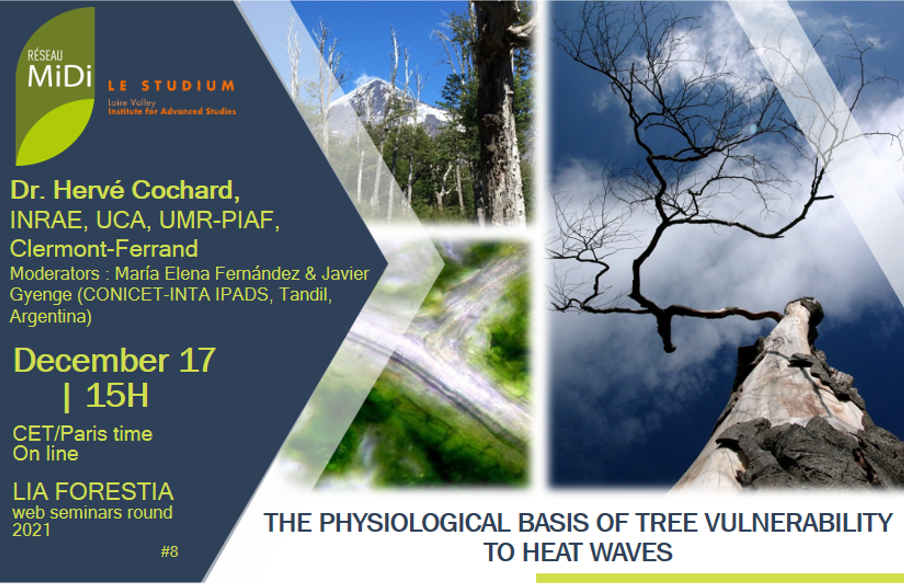« The physiological basis of tree vulnerability to heat waves »
Dr. Hervé Cochard
INRAE, UCA, UMR-PIAF, Clermont-Ferrand
December 17 at 15h (CET/Paris time)
The International Associated Laboratory FORESTIA starts in 2021 a new round of short seminars aimed at stimulating the scientific comunication among its members, as well as between them and other international laboratories. These seminars are a new opportunity for the FORESTIA scientists to present and discuss their objectives, research work and results on adaptation of forest ecosystems to global changes.
Seminar #8 by Dr. Hervé Cochard, INRAE, UCA, UMR-PIAF, Clermont-Ferrand
Abstract
Tree mortality events attributable to heatwave droughts have been increasing globally for several decades and seem to affect all forest ecosystems on the planet. It is feared that this situation will worsen in the future with the increased risk of heatwave and drought predicted by climate models. Understanding the physiological basis of these die-offs can help to identify species or genotypes better adapted to future climatic conditions, but can also improve models for predicting these mortality risks.
An edaphic drought modifies the hydric and hydraulic functions of a tree, and the more intense the drought, the greater the disturbance. Above a certain intensity, cavitation events can occur in the sap conducting tissue of the tree (xylem), which disrupts the water supply to the canopy. When the cavitation rate exceeds a critical threshold, an irreversible point of hydraulic failure of the xylem is reached, leading to desiccation and death of the branches irrigated by this tissue. The vulnerability of the xylem to cavitation thus appears to be a key physiological process in the mortality of trees exposed to drought.
Research work in this field currently focuses on the notion of the risk of hydraulic failure incurred by a tree during a drought. This is a more complex notion that integrates not only the intrinsic vulnerability of the xylem to cavitation, but also the degree of water stress the trees are exposed to. This constraint depends on local soil and climatic conditions and the water balance of the stands, but also on the physiological capacity of the trees to control their water status in these extreme drought situations. This capacity is determined by the water reservoirs stored in the tree, but above all by the minimum residual transpiration of the tree, which will impose its dehydration rate beyond the stomatal regulation point. The permeability of the leaf cuticles plays a major role in this residual transpiration. It varies greatly from one species to another and, above all, it increases sharply above a critical phase transition temperature, which itself varies from one species to another.
To assess the risk of hydraulic breakage, it is necessary to integrate all these physiological processes into a model of the tree’s hydric and hydraulic functioning. The SurEau model that we have developed fulfils this objective. It predicts the evolution of the xylem cavitation rate by taking into account the soil and climatic conditions and the physiological characteristics of the tree. The predictions of the model illustrate the key role of xylem vulnerability to cavitation and cuticle loss in the mortality process. In particular, the model predicts a high risk of cavitation when leaf temperature passes the critical phase transition threshold, which may explain the aggravating effect of heat waves. Furthermore, the model predicts a very strong increase in the risk of cavitation with global warming, even taking into account the « fertilising » effect of atmospheric CO2. The genetic variability and phenotypic plasticity of forest species seems too low to limit this risk.
These round of FORESTIA web seminars will take place Fridays every four weeks, starting on the 4th of June 2021.
>> A new series of seminars planned for 2022
MiDi is a interdisciplinary Research Thematic Network, focused on biodiversity and habitats and funded by the Centre-Val de Loire Region. The network aims to promote studies in multiple fields of BioGeoSciences and Human and Social Sciences in relation to global changes.
This conference is organised in partnership with the Le Studium (Institute for Advanced Studies).
contact: valentin.cognard@univ-tours.fr


